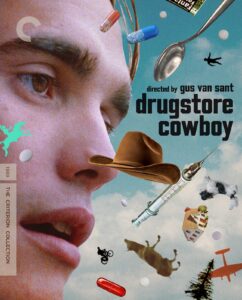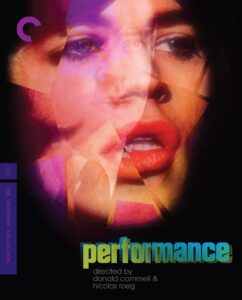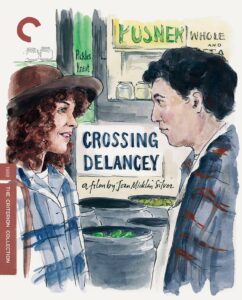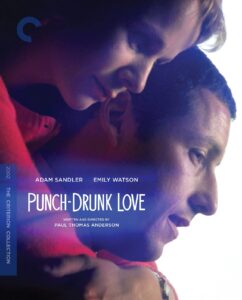Criterion releases four extraordinary films on 4K-UHD this month.
Drugstore Cowboy — 4K UHD-Blu-ray

I am fairly certain I only saw Gus Van Sant’s Drugstore Cowboy once, on its initial release in 1989 and what I recall most was being really impressed with Matt Dillon.
Seeing it now, via Criterion’s stunning 4K-UHD, I was once again blown away by Dillon…and the entire endeavor.
One of the wonders of this pic is just how outright funny and subversively satiric it is and how masterfully Van Sant blends realism with surreality. Most movies about drug addiction are deliberately gritty and morose, with the message that all addicts are totally fucked up being who are all doomed or in desperate need of saving. Van Sant eschews that load of crap and, instead, presents us with four misfit-toy dopers, led by Dillon, who do what they must to get their needed fixes and survive. But they’re also able to function.
Based on James Fogle’s autobiographical novel, Drugstore Cowboy’s screenplay (by Van Sant and Daniel Yost) doesn’t rely on plot as much as atmosphere and characterization. Dillon is Bob Hughes, a mid-twenties slightly-arrestedly developed man living in suburban Oregon, who, along with his ragtag group, go about robbing drugstores and hospitals, to get enough drugs to for the day…or week. Kelly Lynch (Cocktail) is his no-bullshit wife, Dianne. Rounding out the quartet is the not-so-bright-but-cute James LeGros as Rick and his perpetually-picked-on girlfriend, Nadine, played by Heather Graham (Boogie Nights). James Remar (Dexter) makes a significant impression as a cop gunning for Bob. Grace Zabriskie (Twin Peaks) is hilarious and heartbreaking, in just one scene, as Bob’s mom. And William S. Burroughs is eerily effective as a hophead priest.
This was only Van Sant’s second feature, after Mala Noche, and he already had a style all his own. His follow up, two years later, would be an even more penetrating look at youth, My Own Private Idaho, starring River Phoenix and Keanu Reeves.
Dillon was still a teen idol when he made this, in his mid-20s, and had splashed in films like Little Darlings, Tex and The Outsiders but his authentic yet wacked-out turn here would be a game changer for him in terms of what he could accomplish onscreen. But his subsequent film choices did not take advantage of his tremendous talents with a few exceptions—To Die For and Crash—his lone Oscar nomination. I cannot wait to see him as Marlon Brando in Jessica Palud’s biodrama, Being Maria, later this year.
Besides Dillon, the other revelation in the movie is Lynch, who commands the screen with movie star looks and a Juliette-Lewis-type ferocity. The Criterion Blu-ray features a brand-new chat with her that is worth a look for her recollections and her honestly.
The 4K digital restoration proves wondrous with Robert Yeoman’s cinematography is rich in its grittiness.
Included on the 4K and Blu-ray is a 2001 audio commentary with Van Sant and Dillon. The Blu-ray also boasts a 27-minute Making of “Drugstore Cowboy” doc and a new chat with Yeoman as well as a host of deleted/extended/alternate scenes, including a brief but potent sequence featuring Amanda Plummer as Dianne’s sister.
https://www.criterion.com/films/34208-drugstore-cowboy?sell-sheet
Performance — 4K-UHD/Blu-ray

“For me, it sums up the ‘60s.” — Anita Pallenberg on Performance
Donald Cammell & Nicolas Roeg’s directorial debut, Performance, released in 1970, is basically a kaleidoscopic British gangster story on shrooms– beguiling, sometimes frustrating, seriously warped.
The dark cinematic mindfuckery—and sexual and violent content–on display was enough for Warner Brother to wait two years to release it. Performance opened to mixed notices and has gone from gaining cult status to legitimately being considered one of England’s best produced movies of all time. That is wild to me as someone who just watched it for the very first time. There are elements of experimentation with same-sex attraction and sexual identity that is way before it’s time. In addition, I found (and this is rare) that viewing the supplements on this Criterion edition truly enhanced my appreciation of the film—and sent me down several rabbit holes!
Sexy James Fox, who oddly replaced Marlon Brando, plays the role of a ruthless mob henchman, Chas, whose hotheadedness gets him in trouble with his boss, so he must flee London. He finds a Nottingham Hill basement apartment to hid out in where a former rock star, Turner (an alluring Mick Jagger in his screen acting debut) is living with two women, Pherber and Lucy (Anita Pallenberg and Michele Breton). Turner is, at first, apprehensive about having Chas (known as juggler Johnny Dean now) move in, but begins to warm to him.
Perception goes out the window when Pherber slips Chaz/Johnny psychedelic mushrooms and in the film’s most intriguing sequence Turner begins making out with Johnny, who them becomes Lucy as he has sex with her—in his mind anyway, because it becomes apparent he is really actually having sex with Turner.
Warner Brothers insisted that the initial cut be re-edited after a disastrous screening, and Cammell took on the task. WB also dubbed some of the Cockney into a more American sounding accent. For years various versions were show around the world. This Criterion cut is closest to the film that was finally released in 1970.
I’ve never been much of a fan of Roeg’s work, yet every time I see Don’t Look Now again, I am more and more intrigued by it. But, from every indication via interviews, this was more Cammell’s film with Roeg’s contributions mostly cinematographic.
The Criterion supplements are terrific and had me really curious about Cammell’s career. He only made a handful of other films, most were not good experiences, and he committed suicide in 1996. Among the disc special features is an illuminating doc, Donald Cammell: The Ultimate Performance, made in 1998 by Kevin Macdonald and Chris Rodley, that explores his life, philosophies and artistic output. In addition, there’s a fab feature, Influence and Controversy: Making “Performance” (2007) as well as a follow up, Performers on “Performance,” both boast interviews with Cammell, Roeg, Fox, Jagger and Pallenberg. And The True Story of David Litvinoff, is a new visual essay by Keiron Pim, about dialogue coach/tech adviser Litvinoff who was closeted and associated with vicious gangster twin Ronnie Kray. (see both The Krays and Legend, films about these mob brothers).
Pallenberg was Rolling Stone bandmate Keith Richards’ girlfriend at the time of filming, and it’s alleged that Jagger and Pallenberg had an affair during production which drove Richards crazy. This is just one of the fascinating behind the scenes tidbits.
Performance is a film that becomes more bizarre and nightmarish as it unfolds. The movie explores identity and celebrity via an artistic subculture that became mainstream, for a decade or so, anyway.
Performance will be released on February 25, 2025
https://www.criterion.com/films/30003-performance?sell-sheet
Crossing Delancey — 4K-UHD

Joan Micklin Silver’s enchanting and winsome 1988 feature, Crossing Delancey, written by Susan Sandler, based on her play, blends rom-com with an awkward authenticity that makes it soar from start to finish. It’s an absolute joy and the new and lush Criterion 4K digital restoration had me loving every minute of it.
Silver was best known for her first feature, the 1975 classic Hester Street, which brought Carol Kane her only Oscar nomination to date—and a surprise one at that. Her two theatrical follow-ups, Between the Lines (1977) and Chilly Scenes of Winter (aka Head Over Heels) (1979) received critical acclaim but were not successful at the box office. Crossing Delancey would go on to receive positive reviews and do quite well in theaters.
The film follows an unmarried 33-year-old Jewish woman and how she balances independence with romance in the NYC 1980s. Izzy (Oscar nominee Amy Irving in a career best turn) is a seemingly content bookstore manager who is defiantly not seeking love, unless it’s with an egotistical Dutch-American author (sexy Jeroen Krabbé), who is more enamored with himself than anyone else. Izzy has a loving relationship with her bubbie (Yiddish theater star Reizl Bozyk, fantastic in her only screen performance), who is friendly with the local matchmaker (2-time Oscar nominee Sylvia Miles, just a hoot) and hires her to find Izzy a match. Enter Sam, the pickle man (sexy Peter Riegert), who Izzy dismisses at first but slowly changes her mind.
Crossing Delancey deals with class culture clashes and modern relationship matters, always told via a non-judgmental and empowering female perspective.
Bozyk near steals the picture, although every performance is just wonderful. I’m not sure why she wasn’t cited in year-end awards in 1988. Irving was justly nominated for a Comedy or Musical Best Actress Golden Globe, losing to Melanie Griffith in Working Girl. A strong argument can be made that Irving’s performance holds up much better today.
The 4K looks fantastic and was supervised and approved by cinematographer Theo van de Sande, whose work is exquisite. The audio is fab, and the great soundtrack features songs by The Roches. Special features, on the Blu-ray include a 1988 audio chat with Silver (who died in 2020) and a terrific new (2024) 30-minute ‘making of’ feature boasting interviews with Sandler, Irving and Riegert.
Note: The Criterion Channel this month is featuring six of Silver’s films: Hester Street, Crossing Delancey, Chilly Scenes of Winter, Between the Lines as well as two hard to find TV movies she helmed, Bernice Bobs Her Hair and A Fish in the Bathtub. Do yourself a favor and plan a bingefest! https://www.criterionchannel.com/directed-by-joan-micklin-silver
Crossing Delancey deserves to take its place alongside classic rom-coms of its time like Annie Hall, The Goodbye Girl, Starting Over, Romancing the Stone, Broadcast News and Moonstruck.
https://www.criterion.com/films/34764-crossing-delancey?sell-sheet
Punch-Drunk Love — 4K-UHD/Blu-ray

And speaking of unusual rom-coms, Paul Thomas Anderson’s singular strangeness, 2002’s Punch-Drunk Love, was everything I remembered and had me transfixed for 95 minutes.
This was Anderson’s fourth feature after the triple creative successes of Hard Eight, Boogie Nightsand Magnolia. His decision to do something a bit lighter proved highly fruitful, at least artistically.
Barry Egan (Adam Sandler in, by far, his best role) is a weird and bad-tempered novelty salesman of sorts who seems to spend all of his office time answering phone calls from his seven demanding sisters, who enjoy insulting and abusing him. He has devised a plan to buy $3000 worth of Healthy Choice pudding in order to take advantage of promotions that could allow him to amass one million frequent flyer miles. The true story of the man who actually did this was Anderson’s initial inspiration for the film.
Meanwhile Barry’s sister Elizabeth (24’s Mary Lynn Rajskub) introduces him to one of her co-workers, Lena Leonard (the always brilliant Emily Watson) and they instantly fall for one another. It turns out she’s a bit off-kilter as well. But a late-night call to a sex worker comes back to bite Barry in the butt when a pack of four goons arrive to steal money from him. This eventually pisses Barry off, which is not a good thing for the goons or the mattress salesman/pimp (Philip Seymour Hoffman) who sent them.
Anderson won the Cannes Film Festival Best Director Award for Punch-Drunk and Adam Sandler received a Golden Globe Best Actor nomination in the Comedy/Musical category. I hadn’t seen the film in a bit but am delighted to report that it’s a dark, enigmatic, whimsical treat.
Jon Brion’s score is terrific, and Jeremy Blake’s cinematic art enhancements are mesmerizing.
Highlighted supplements on the Blu-ray include an NBC Nightly News interview with David Phillips, the actual frequent flyer miles, “pudding guy,” and two funny deleted scenes as well as the Cannes Film Festival press conference, among a host of other features. The Cannes PC is a great example of the stupid media questions artists have forced on them at such events.
Punch-Drunk Love is the perfect anti-rom-com. And that’s an awesome thing.
https://www.criterion.com/films/27916-punch-drunk-love?sell-sheet









